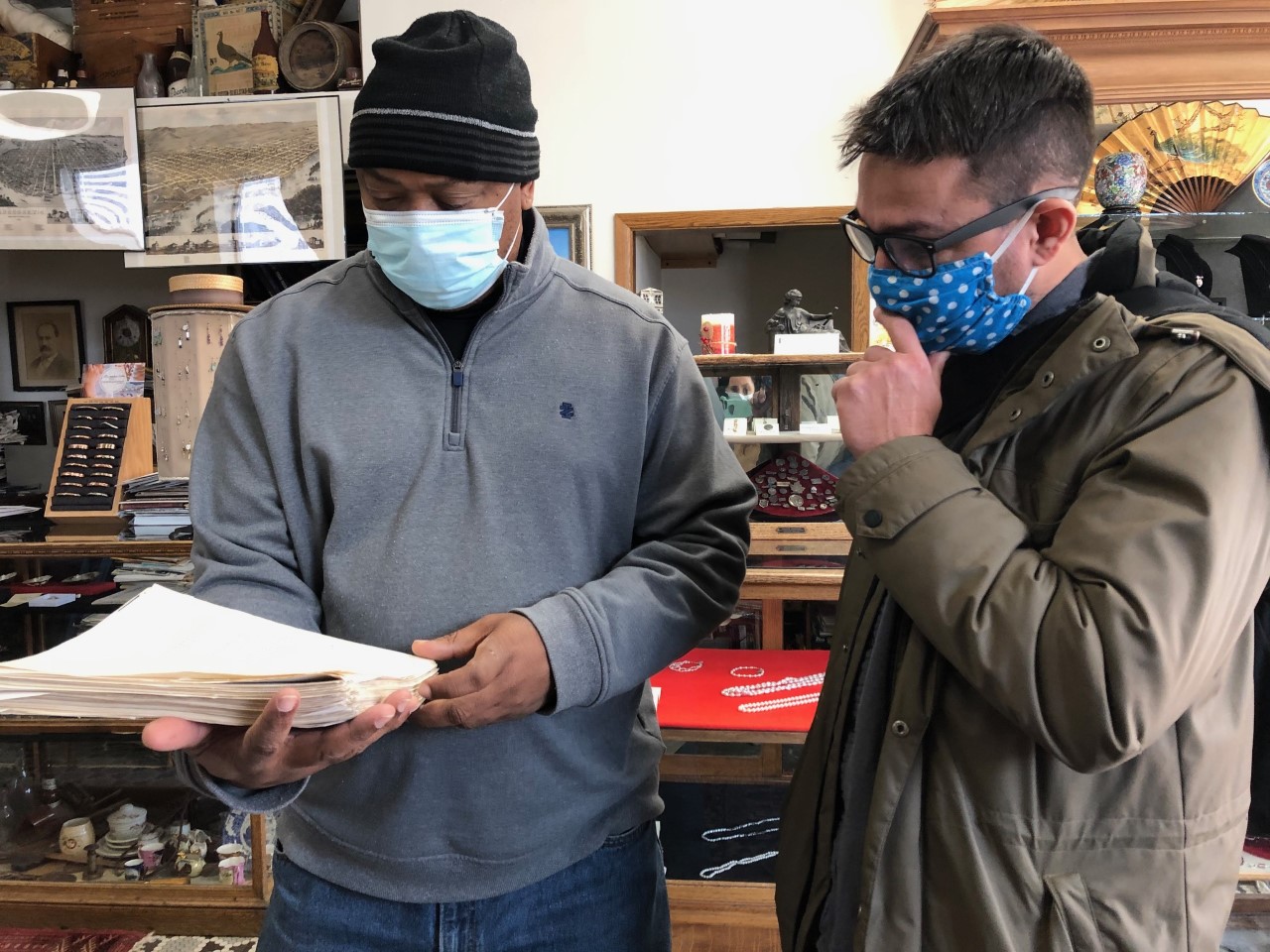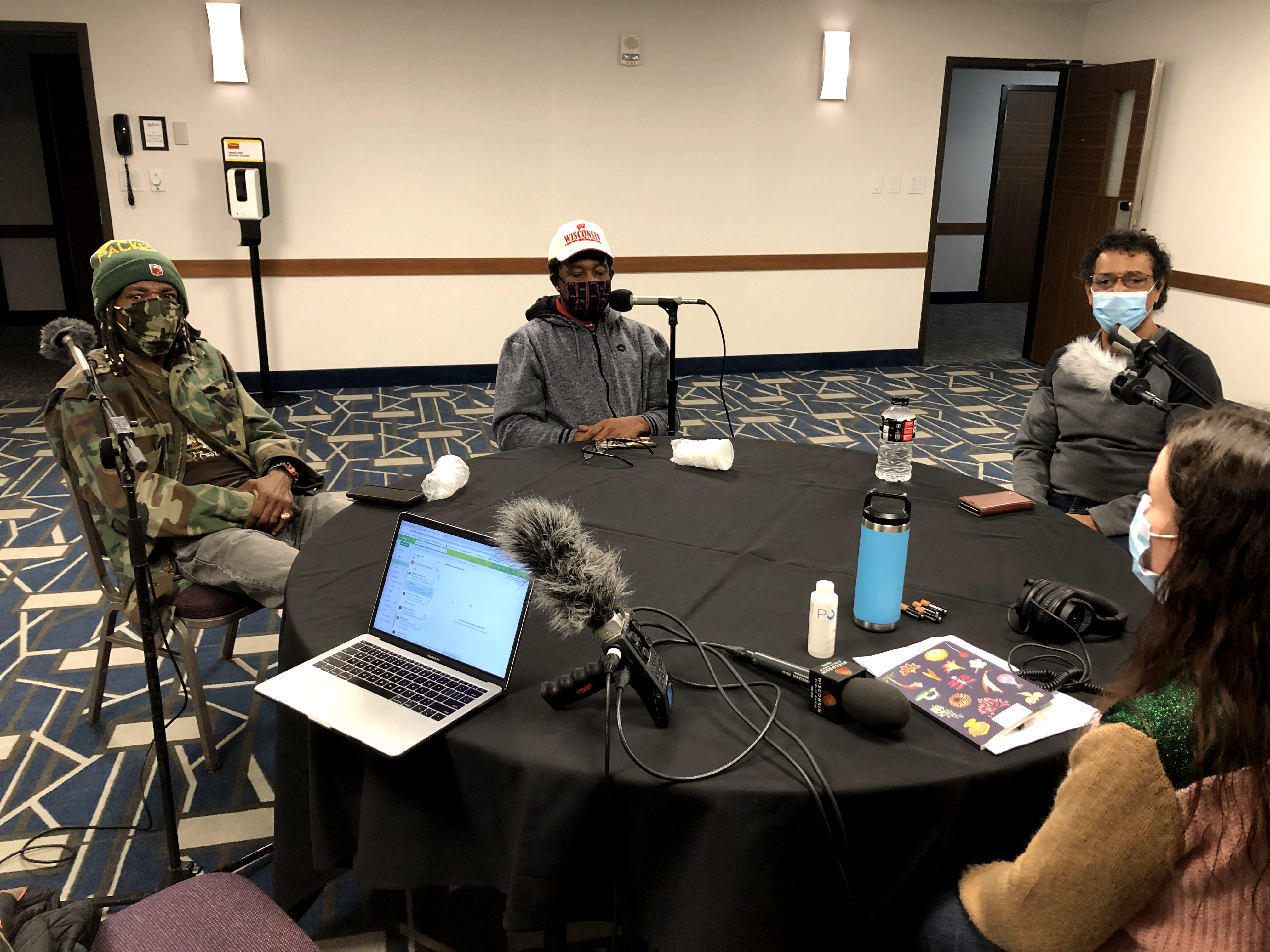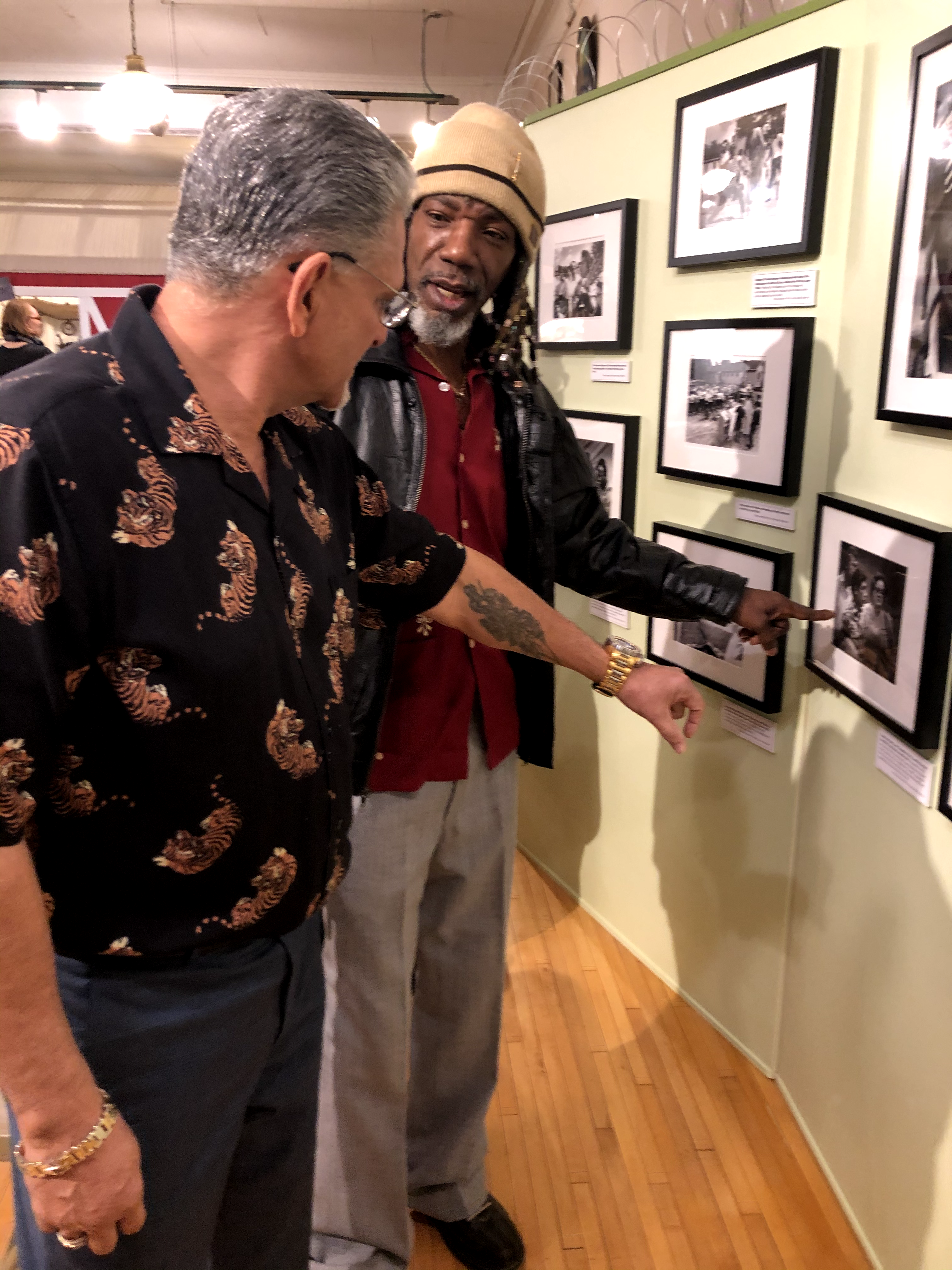
About the Project / Acerca de este proyecto
Sharing traumatic memories from the journey from Mariel to Fort McCoy, as well of the difficult resettlement years that followed that summer of 1980, has been a strenuous and emotionally-taxing task for our collaborators who were Mariel refugees. Through their contributions to Uprooted they have reconnected with former camp interpreters, army and camp personnel and old sponsors. The Wisconsin Mariel community are rewriting, now in their own words, a unique and neglected segment of the history of the Mariel Exodus and the state of Wisconsin.
Compartir los traumáticos recuerdos del viaje desde Mariel a Fort McCoy, así como los difíciles años de que siguieron a ese verano de 1980, ha sido una tarea extenuante y emocionalmente agotadora para nuestros colaboradores que fueron refugiados de Mariel. A través de este proyecto, ellos se han reconectado con antiguos intérpretes del campamento, personal del ejército y antiguos patrocinadores. La comunidad de cubanos del Mariel de Wisconsin está reescribiendo, ahora en sus propias palabras, un segmento único y olvidado de la historia del Éxodo de Mariel y del estado de Wisconsin.
Images courtesy of Wisconsin Public Radio. Photographer Maureen McCollum.
By collaborating in this public scholarship project, Mariel refugees have gained their own political voice. They have gained significant awareness of the social, legal and migratory policies that have discriminated them for decades, and they have united as a community to advocate for more visibility and racial justice for themselves. Much of our work is done with the defined objective of gaining the support of Wisconsin state legislators and elected government representatives towards obtaining federal legal pardons for many members of this community who remain ineligible to gain U.S. citizenship status.
Al colaborar en este proyecto, los refugiados de Mariel han ganado su propia voz política. Ellos han ganado una conciencia significativa de las políticas sociales, legales y migratorias que los han discriminado durante décadas, y se han unido como comunidad para abogar por una mayor visibilidad y justicia racial. Gran parte de nuestro trabajo se realiza con el objetivo de obtener el apoyo de los legisladores del estado de Wisconsin y los representantes del gobierno electo para obtener indultos legales para muchos miembros de esta comunidad que siguen sin ser elegibles para convertirse en ciudadanos estadounidenses.
In Memoriam
Image courtesy of Wisconsin Public Radio. Photograph by Angela C. Major.
Marcos Calderón Hernández
(June 3, 1957 - March 2, 2024)
This project is dedicated to our dear friend and keen collaborator Marcos, a Mariel refugee who always smiled. He was never able to return to his beloved Havana.
Project Staff
Dr. Omar Granados
Associate Professor of Spanish and Latin American Studies, University of Wisconsin-La Crosse
Granados curated this exhibit, selecting and translating documents and texts for the website and directing all aspects relating to the historical and academic organization of the site. Granados also coordinated the participation of Cuban refugees in the curating of the exhibit and public events planned for the project. Granados grew up in Havana, Cuba, and has lived in La Crosse for a decade.
Jenny DeRocher
Librarian, La Crosse Public Library Archives & Local History Department
DeRocher is the project's digitization lead, working in coordination with other project staff on digitizing over 250 objects and creating metadata for each. DeRocher also played a key role in designing this website.
Dane DeVetter
Director, Language Resource Center, University of Wisconsin-La Crosse
DeVetter worked closely with Dr. Granados and DeRocher in the digitization of historical artifacts and the development of the website and digital exhibit. He served as the final editor of texts in the bilingual exhibit.
Anita Taylor Doering
Senior Archivist & Archives Manager, La Crosse Public Library Archives & Local History Department
Doering instructed and oversaw metadata creation and assured that the original master scans met best practices in terms of scanning quality and long-term preservation as described by the Society of American Archivists, as well as meeting metadata standards of Dublin Core. Doering mentored DeRocher throughout the process.
Livi Hackbarth
Assistant Librarian, Access & Engagement Department, La Crosse Public Library
Hackbarth worked closely with DeRocher creating the metadata for the digital objects in this exhibit.
Ernesto Rodríguez
Rodríguez is a retired La Crosse resident who emigrated from Cuba in the Mariel exodus in 1980 and spent several months detained at Fort McCoy. Rodríguez assisted in the curation of our digital exhibit and is featured in video and audio interviews on this website. Rodríguez also serves as a panel participant and Mariel expert at public events associated with this project.
Rodosvaldo Pozo
Pozo is a retired La Crosse resident who emigrated from Cuba in the Mariel exodus in 1980 and spent several months detained at Fort McCoy. Pozo serves as a panel participant and Mariel expert at public events associated with this project.
Marcos Calderón Hernández
Hernández was a La Crosse resident who emigrated from Cuba in the Mariel exodus in 1980 and spent several months detained at Fort McCoy. Hernández was meant to to serve as a panel participant and Mariel expert at public events associated with this project, but he tragically passed away in March of 2024.
Project Partners & Affiliates
Wisconsin Humanities
Uprooted: The Interactive Exhibit was funded in part by a grant awarded by Wisconsin Humanities in October 2023, with funds from the National Endowment for the Humanities and the State of Wisconsin. Any views, findings, conclusions or recommendations expressed in this project do not necessarily represent those of the National Endowment for the Humanities. Wisconsin Humanities strengthens our democracy through educational and cultural programs that build connections and understanding among people of all backgrounds and beliefs throughout the state.
University of Wisconsin-La Crosse Global Languages & Cultures Department
Both Omar Granados (Project Director) and Dane DeVetter (curator and webmaster) work in the UWL Global Languages & Cultures Department. The time they put into Uprooted: The Interactive Exhibit was outside of their regular work, and were both funded by the 2023 Wisconsin Humanities grant awarded for this project. This department and the Institute for Latin American and Latino Studies also provided in-kind funds to promote this project and fund an event to debut this project.
La Crosse Public Library Archives (LPLA)
Uprooted: The Interactive Exhibit is hosted on La Crosse History Unbound, a website managed by La Crosse Public Library Archives staff and resources. All photographs digitized in 2023-2024 at Fort McCoy for this exhibit are hosted on the LPLA digital content platform Rescarta. These photos were digitzed using LPLA staff and time, and the metadata compiled for these photographs was completed by La Crosse Public Library staff members Anita Taylor Doering, Jenny DeRocher, and Livi Hackbarth. This work is all considered in-kind of the 2023 Wisconsin Humanities grant awarded for this project.
Fort McCoy Public Affairs Office
This department was instrumental in digitizing the 250+ photographs held at Fort McCoy that were taken by U.S. Army officials and FEMA volunteers during the 1980 Mariel Exodus. The physical photographs hosted on the LPLA digital content platform Rescarta are all held at the Fort McCoy Commemorative Area, and it was the Public Affairs Office that gave our project access to these photographs.
Wisconsin Public Radio
In 2022, Wisconsin Public Radio released the 8-episode podcast WPR Reports: Uprooted, hosted by WPR produced Maureen McCollum and Omar Granados. Throughout the podcast, Mariel Exodus refugees in the La Crosse and Madison areas are interviewed, and their stories are told from their own perspectives while McCollum and Granados provide the historical global, national, and local context for what is going on in their lives. This podcast is sprinkled throughout the Uprooted: The Interactive Exhibit.
University of Wisconsin-La Crosse Murphy Library
Some of the archival materials featured in Uprooted: The Interactive Exhibit are held by the UWL Murphy Library Special Collections & Area Research Center. These photographs were donated by the La Crosse Tribune, and digitized by Murphy Library staff in 2016. Also in this digital collection is the El Mercurio de McCoy, a newsletter published at Fort McCoy during the summer of 1980. It was edited and printed in coordination between FEMA camp officers and the U.S. Civil Affairs Psychological Operations (CA/PSYOP) division.
Álvarez, Lillian. Cuban Migration to the United States: Reflections on the Past, Present, and Future. University of Florida Press, 2017.
Anderson, Jennifer. Cuban Refugees in the United States: The Mariel Exodus and Its Impact on Immigration Policy. University of North Carolina Press, 2015.
Arbona, Consuelo. "The Mariel Boatlift and Its Impact on Cuban Americans." Journal of Social Issues, vol. 43, no. 3, 1987, pp. 101-121.
Ayala, César J., and Rafael Bernabe. Cuba's Exodus: A Historical and Comparative Study of Cuban Migration. 2017.
Baker-Cristales, Colleen. Immigration Detention in the United States: Rights, Resistance, and Reform. Rutgers University Press, 2018.
Baker, Cynthia. The Mariel Boatlift: A Refugee Crisis in the 1980s. University of Texas Press, 1997.
Baker, Peter. “Behind the Mariel Exodus: U.S. Immigration Policy and Cuban Refugees.” Latin American Politics and Society, vol. 47, no. 4, 2005, pp. 45-69.
Berkeley, Leanne. The Detention and Deportation of Immigrants in the United States: Narratives of Injustice. 2016.
Blanton, Thomas. The Cuban Revolution in the World: The Global Impact of Cuba's Quest for Sovereignty. 2019.
Chomsky, Aviva, Barry Carr, and Pamela Maria Smorkaloff, editors. The Cuba Reader: History, Culture, Politics. 3rd ed. Duke University Press Books, 2018.
Davis, Angela. "Mariel and the Crisis of U.S. Immigration Law." Critical Sociology, vol. 25, no. 1, 1999, pp. 89-112.
Diaz, Alex. Detained at Mariel: Cuban Refugees in U.S. Immigration Detention Centers. Palgrave Macmillan, 2012.
Domínguez, Jorge I. Cuba and Its Neighbors: Democracy in Motion. 2016.
Fernández, Laura L. H. Migrants and Refugees: The Politics of Cuban Migration. 2021.
Ferrer, Ada. Freedom's Mirror: Cuba and Haiti in the Age of Revolution. University of North Carolina Press, 2015.
FitzGerald, David Scott, and David Cook-Martín. Culling the Masses: The Democratic Origins of Racist Immigration Policy in the Americas. Harvard University Press, 2014.
FitzGerald, David Scott. The Nation and Its "Others": Migrant Detention in the European Union. University of California Press, 2018.
García, Celia M. Leaving Cuba: A Memoir. 2018.
Garcia, Maria Cristina. Havana USA: Cuban Exiles and Cuban Americans in South Florida. University of North Carolina Press, 2017.
Garcia, Maria Cristina. The Mariel Boatlift: Cuba, the U.S., and the Politics of Migration. Princeton University Press, 2011.
Gersh, Cynthia A. H. From Cuba to the United States: A Guide to the Cuban American Experience. 2017.
González, Alfredo J. Exiled: The Agony of the Cuban Revolution. 2015.
González, Roberto G. “Mariel: A Turning Point in U.S.-Cuba Relations.” Cuban Studies, vol. 35, 2004, pp. 123-140.
González, Roberto G. Cuban Miami. University of North Carolina Press, 2017.
González, Sergio D. Cuban Exiles and the Diaspora: Shifting Identities and Transformations. 2019.
Guerra, Lillian. Cuban-American Voices: Oral Histories of Cuban Exiles in the United States. 2015.
Hernández, Kelly Lytle. Cuban Exile and the Politics of Immigration in the United States. Harvard University Press, 2016.
Hernandez, Kelly Lytle. Migra! A History of the U.S. Border Patrol. University of California Press, 2010.
Hernández, Virginia. The Border and Beyond: Immigration Detention in a Time of Crisis. 2022.
Heroy, Elizabeth K. Cuban Migration and Refugee Policy: The United States and Beyond. 2016.
Horne, Gerald R. A. Cuban Privilege: The Making of a National Elite. 2017.
López, Juan Antonio. Cuban Refugees in the United States: The Social Impact of the Mariel Exodus. Garland Publishing, 1994.
Portes, Alejandro, and Rubén G. Rumbaut. Immigrant America: A Portrait. University of California Press, 2001.
Reid, Andrew. Exile and Incarceration: The Mariel Exodus and the U.S. Detention Camps. Routledge, 2020.
Sánchez, María Cristina. Bitter Sugar: Cuban Immigration and U.S. Policy in the 20th Century. Routledge, 2017.
Shah, Nandini. The Immigration Industrial Complex: Why We Should Abolish Immigration Detention Centers. 2016.
Sullivan, A. D. Human Rights and Immigration Detention: Policy and Practice. Edward Elgar Publishing, 2017.
Tannenbaum, David. Refugees in Limbo: Cuban Migration and U.S. Immigration Policies. Harvard University Press, 2017.
Tannenbaum, David. Refugees in Limbo: The Mariel Exodus and U.S. Detention Policy. Harvard University Press, 2016.
Tuck, Emily. Deportation Nation: U.S. Immigration Detention and the Politics of Exclusion. Princeton University Press, 2017.
Wright, Erica. The Politics of Immigration Detention: Prisoners of Profit. 2020.
Wright, Matthew. Deportation and the Confinement of the Undocumented: The Impact of Detention on Immigrant Families. Columbia University Press, 2019.
Wright, Thomas. Guantanamo: An American History. Grove Press, 2015.
Zúñiga, Gustavo. The Legacy of Mariel: Cuban Immigrants and the American Dream. Cambridge University Press, 2019.


